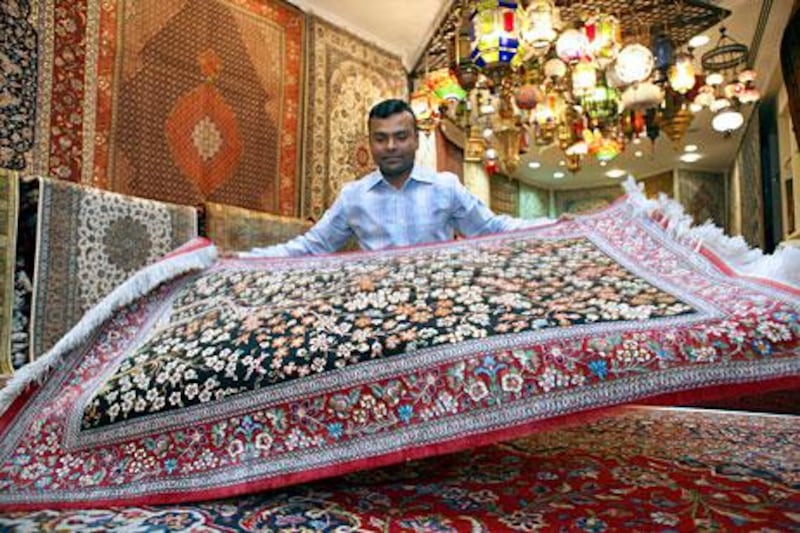The price of Persian carpets is expected to plunge as a result of oversupply following a US ban on their importation on Thursday. Traders said the loss of the American market would result in more carpets coming to the UAE, helping to reduce their price. "What would happen is that they will bring most of the carpets which were supposed to go to America here," said Jalal Didar, a branch sales manager at Persian Carpet House and Antiques. "The oversupply of the carpets will definitely reduce the price here." Carpet prices at Mr Didar's shop, located at the Blue Souk central market in Sharjah, range from Dh500 (US$136) to Dh1 million depending on size, fabric and workmanship. Prices could fall by as much as half, he said.
Munaz Mohammed, another salesman at the souq, said this would mean lower income for carpet makers. "Just because America stops buying does not mean people in Iran will stop making carpets. They will continue, only now they may get paid less for their carpets," he said. Barmij Lajbar, a Persian carpet seller at the Saed Rashid Saeed Salem Carpet Shop at the Friday market in Masafi, said the US ban may also bring a better quality of carpet to the UAE. "America is a big market for Iranian carpets and they always send the best carpets there and to Europe. "Now that they can't send them there anymore, some of those best quality carpets meant for America will be brought here," said Mr Lajbar.
The Iranian carpets business is valued at $500 million a year globally. The US carpet ban is one of a series of sanctions introduced by Washington to increase pressure on Tehran to abandon its uranium enrichment programme. Sanctions imposed by the UN, supported and enforced by the UAE, do not affect carpets. The Oriental Rug Importers Association (ORIA) in America has warned its members to prepare for the end of the Iranian carpet trade for the foreseeable future. "A conference agreement on Iran sanctions legislation appears to have been reached. Among the agreed provisions is re-imposition of the import ban on all Iranian goods and services, which would block US imports of Iranian carpets and pistachios, reversing the Clinton-era lifting of the embargo," said Lucille Laufer, the executive director of ORIA, in a statement to its members. Iranian officials said the US ban would have only a short-term effect as they expected other markets to fill the gap.
"It may have some effects for now but we will send the carpets to other markets," said Amir Mohammadi, the director of public relations for the Iran Trade Promotion Organisation. Mr Mohammadi said other markets were opening up, especially in Asia, which might absorb the extra volumes left by the American market closure. Iran is one of the UAE's most important trading partners, predominantly because of Dubai's role as a re-export hub. "Most Iranian products exported or imported through Dubai were things that were going or coming from the West," said Bihan Mahjoub, an import-export businessman in Dubai. Ghanem Nuseibeh, a partner at the consultancy Cornerstone Global Associates and senior analyst at the Dubai think tank Political Capital, said the new ban would hurt the re-export business in the Emirates.
business@thenational.ae






